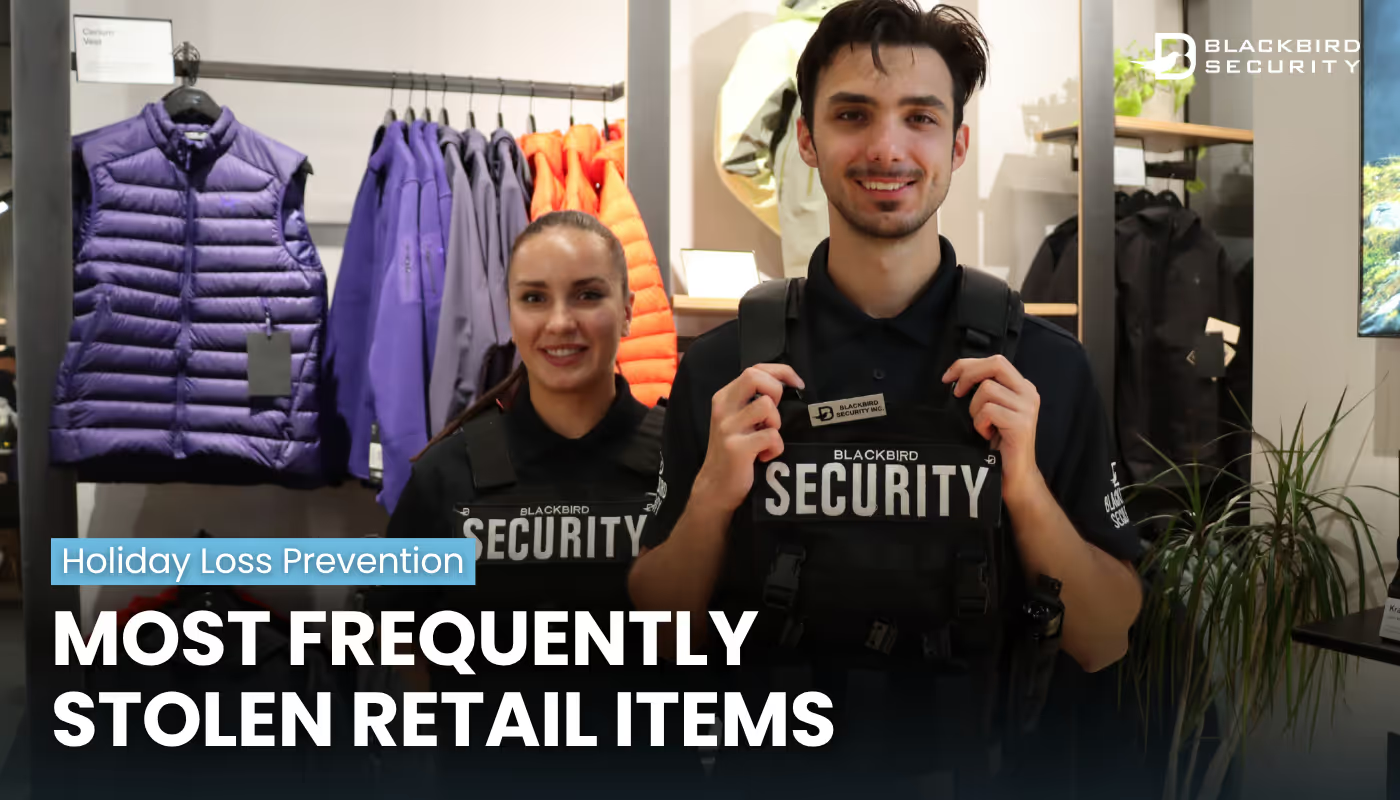Back
Back

High-value items are frequently targeted by thieves during the holiday season. Since these items carry high price tags, even a single theft can be a significant hit to a store’s bottom line. For retailers and local law enforcement alike, retail security is a top-of-mind issue as the holiday season approaches. If you’re a store owner or manager interested in learning how best to protect your business during the holidays, this guide will outline some key strategies and takeaways to keep in mind throughout Q4.

Retail theft, also referred to as shrinkage, involves individuals stealing goods from stores. Retail thefts typically fall into one of three categories that require distinct strategies to combat:
Organized retail crime (ORC) refers to professional, large-scale thefts committed by groups of individuals. These groups intend to sell the stolen items at a profit on the black market or a secondary market. These markets may include flea markets, pawnshops, and online marketplaces like eBay, Craigslist, and Facebook Marketplace.
ORC operations typically involve two groups: ‘boosters’ who conduct the retail thefts, and 'fences' who receive and resell the stolen merchandise at a profit. Stolen merchandise is commonly distributed across nationwide networks, making inventory recovery difficult. ORC groups are often involved in other syndicated crime schemes, such as fraud, human trafficking, drug distribution, and money laundering.
Compared to ORC, shoplifting is committed on a much smaller scale by individuals who intend to personally use the stolen items rather than sell them. Shoplifting incidents may seem minor compared to organized thefts, but their frequency can quickly add up to significant losses. Consistent shoplifting contributes to inventory shrinkage, can disrupt the experience of legitimate shoppers, and often negatively affects employee morale.
Employee theft is a commonly overlooked form of retail theft, yet it can be damaging. Since employees have access to stockrooms and registers and may understand security blind spots within their store, internal theft can go undetected for a long time.
Effective loss prevention strategies and the presence of retail security guards can reduce all three types of retail theft.
According to the National Retail Federation’s National Retail Security Survey, inventory shrinkage represented $112.1 billion in losses for the retail industry in 2022 alone. This impacts individual retailers' operations and can drive up prices for legitimate consumers.
In addition to financial losses, theft creates unsafe shopping and working environments, particularly when it is organized. ORC members commit thefts quickly and often run in and out of stores to secure their stolen goods, without regard for legitimate customers who may be injured in the process. Store workers who attempt to obstruct a thief’s path may also become victims of violence.
These factors make professional retail security services invaluable for stores as they head into the busy holiday season.

In this section, we’ll break down the most commonly stolen items during the holidays. Departments containing these items would likely benefit from a security revamp ahead of the holiday season.
ORC groups most often target items with high resale value on the black market. “ORC groups most often steal designer and luxury goods with recognizable brand names, even if those items aren’t the most expensive in the store,” said Amir Anvarizadeh, National Training and Development Manager at Blackbird Security. “For example, if a store carries a Gucci perfume and an expensive niche perfume, ORC will target the Gucci item based on brand recognition.”
Some of the most commonly stolen items by ORC groups include:
Goods stolen by ORC groups and ordinary shoplifters often overlap, particularly where designer goods are concerned. However, since shoplifters primarily use stolen goods for personal use, they also tend to steal more everyday items. In addition to high-value items, be alert for theft of the following personal-use items this holiday season:
Retail security measures are the most proactive solution for businesses in the fight against retail crime. Here are our top recommendations for keeping your business safe during the holidays:
Retail security guards are trained to handle all kinds of theft and will take immediate action to protect your store, customers, and staff. Here’s a quick breakdown of the types of guards we typically deploy to stores:
Having trained security guards on site to address incidents reduces the risk of an untrained staff member or bystander intervening and potentially getting hurt.
A well-designed store layout is one of the simplest ways to reduce shoplifting. Keep high-value items in clear view of staff or behind checkout counters, and minimize hidden corners or blind spots within your store. Use mirrors and CCTV cameras to extend visibility into hard-to-monitor areas.
Provide basic loss prevention training to all team members, including how to recognize suspicious behaviour and how to report it safely. Teach staff to engage shoppers with friendly greetings and attentive customer service, which can deter potential shoplifters. Encouraging a culture of accountability, ownership, and workplace pride at your store can help reduce both external and internal shoplifting.
Critically, ensure employees know never to intervene directly during organized thefts. Instead, instruct them to dial 911 immediately while keeping customers at a safe distance from the ongoing theft.
Visible deterrents go a long way. Use electronic article surveillance (EAS) tags on high-value items and install visible EAS antennas at store entrances to deter potential shoplifters. The presence of EAS tags and antennas alerts shoplifters that an alarm will sound if they attempt to exit with unpaid merchandise.
Your retail security partner will provide customized recommendations specific to your store space for the holidays.

A professional retail security company will keep your inventory, workers, and customers safe against threats posed by retail crime this holiday season. At Blackbird Security, our retail teams have years of experience handling challenges in the industry.
Retailers trust us to prevent ORC at their stores. We recently partnered with H&M to host an event in Toronto, where we spread awareness and shared insights about the threat of ORC. In addition to H&M, we have the privilege of safeguarding several high-value merchandise stores across Canada, including Best Buy, Moose Knuckles, Holt Renfrew, and Arc’teryx.
Contact us today to secure retail security coverage for your business in time for the holiday season.



